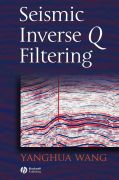
Seismic inverse Q filtering is a data processing technology for enhancing theresolution of seismic images. It employs a wave propagation reversal procedure that compensates for energy absorption and corrects wavelet distortion due to velocity dispersion. By compensating for amplitude attenuation, seismic datacan provide true relative-amplitude information for amplitude inversion and subsequent reservoir characterization. By correcting the phase distortion, seismic data with enhanced vertical resolution can yield correct timings for lithological identification. This monograph presents the theory of inverse Q filtering and a series of algorithms, collected with the following selection criteria in mind: robustness, effectiveness and practicality. The book is written forprocessing geophysicists who are attempting to improve the quality of seismicdata in terms of resolution and signal-to-noise ratio, as well as for reservoir geophysicists who are concerned about seismic fidelity in terms of true amplitudes, true timings and true frequencies. It will also be particularly valuable as a guide for seasoned geophysicists who are attempting to develop seismic software for various research settings. Finally, it can be used as a reference work or textbook for postgraduate students in seismic and reservoir geophysics.
- ISBN: 978-1-4051-8540-0
- Editorial: Blackwell
- Encuadernacion: Cartoné
- Páginas: 248
- Fecha Publicación: 01/04/2008
- Nº Volúmenes: 1
- Idioma: Inglés
